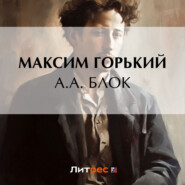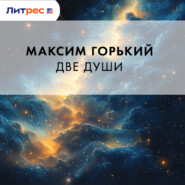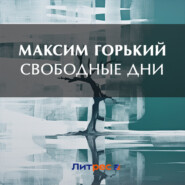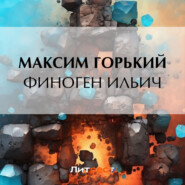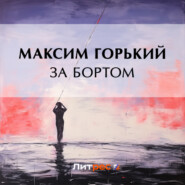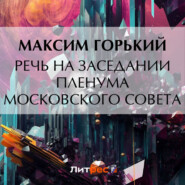По всем вопросам обращайтесь на: info@litportal.ru
(©) 2003-2025.
✖
Mother
Настройки чтения
Размер шрифта
Высота строк
Поля
Behind the mother lay the city; in front the cemetery; to the right, about seventy feet from her, the prison. Near the cemetery a soldier was leading a horse by a rein, and another soldier tramped noisily alongside him, shouted, whistled, and laughed. There was no one else near the prison. On the impulse of the moment the mother walked straight up to them. As she came near she shouted:
"Soldiers! didn't you see a goat anywhere around here?"
One of them answered:
"No."
She walked slowly past them, toward the fence of the cemetery, looking slantwise to the right and the back. Suddenly she felt her feet tremble and grow heavy, as if frozen to the ground. From the corner of the prison a man came along, walking quickly, like a lamplighter. He was a stooping man, with a little ladder on his shoulder. The mother, blinking in fright, quickly glanced at the soldiers; they were stamping their feet on one spot, and the horse was running around them. She looked at the ladder – he had already placed it against the wall and was climbing up without haste. He waved his hand in the courtyard, quickly let himself down, and disappeared around the corner. That very second the black head of Mikhaïl appeared on the wall, followed by his entire body. Another head, with a shaggy hat, emerged alongside of his. Two black lumps rolled to the ground; one disappeared around the corner; Mikhaïl straightened himself up and looked about.
"Run, run!" whispered the mother, treading impatiently. Her ears were humming. Loud shouts were wafted to her. There on the wall appeared a third head. She clasped her hands in faintness. A light-haired head, without a beard, shook as if it wanted to tear itself away, but it suddenly disappeared behind the wall. The shouts came louder and louder, more and more boisterous. The wind scattered the thin trills of the whistles through the air. Mikhaïl walked along the wall – there! he was already beyond it, and traversed the open space between the prison and the houses of the city. It seemed to her as if he were walking very, very slowly, that he raised his head to no purpose. "Everyone who sees his face will remember it forever," and she whispered, "Faster! faster!" Behind the wall of the prison something slammed, the thin sound of broken glass was heard. One of the soldiers, planting his feet firmly on the ground, drew the horse to him, and the horse jumped. The other one, his fist at his mouth, shouted something in the direction of the prison, and as he shouted he turned his head sidewise, with his ear cocked.
All attention, the mother turned her head in all directions, her eyes seeing everything, believing nothing. This thing which she had pictured as terrible and intricate was accomplished with extreme simplicity and rapidity, and the simpleness of the happenings stupefied her. Rybin was no longer to be seen – a tall man in a thin overcoat was walking there – a girl was running along. Three wardens jumped out from a corner of the prison; they ran side by side, stretching out their right hands. One of the soldiers rushed in front of them; the other ran around the horse, unsuccessfully trying to vault on the refractory animal, which kept jumping about. The whistles incessantly cut the air, their alarming, desperate shrieks aroused a consciousness of danger in the woman. Trembling, she walked along the fence of the cemetery, following the wardens; but they and the soldiers ran around the other corner of the prison and disappeared. They were followed at a run by the assistant overseer of the prison, whom she knew; his coat was unbuttoned. From somewhere policemen appeared, and people came running.
The wind whistled, leaped about as if rejoicing, and carried the broken, confused shouts to the mother's ears.
"It stands here all the time."
"The ladder?"
"What's the matter with you then? The devil take you!"
"Arrest the soldiers!"
"Policeman!"
Whistles again. This hubbub delighted her and she strode on more boldly, thinking, "So, it's possible —he could have done it!"
But now pain for her son no longer entered her heart without pride in him also. And only fear for him weighed and oppressed her to stupefaction as before.
From the corner of the fence opposite her a constable with a black, curly beard, and two policemen emerged.
"Stop!" shouted the constable, breathing heavily. "Did you see – a man – with a beard – didn't he run by here?"
She pointed to the garden and answered calmly:
"He went that way!"
"Yegorov, run! Whistle! Is it long ago?"
"Yes – I should say – about a minute!"
But the whistle drowned her voice. The constable, without waiting for an answer, precipitated himself in a gallop along the hillocky ground, waving his hands in the direction of the garden. After him, with bent head, and whistling, the policemen darted off.
The mother nodded her head after them, and, satisfied with herself, went home. When she walked out of the field into the street a cab crossed her way. Raising her head she saw in the vehicle a young man with light mustache and a pale, worn face. He, too, regarded her. He sat slantwise. It must have been due to his position that his right shoulder was higher than his left.
At home Nikolay met her joyously.
"Alive? How did it go?"
"It seems everything's been successful!"
And slowly trying to reinstate all the details in her memory, she began to tell of the escape. Nikolay, too, was amazed at the success.
"You see, we're lucky!" said Nikolay, rubbing his hands. "But how frightened I was on your account only God knows. You know what, Nilovna, take my friendly advice: don't be afraid of the trial. The sooner it's over and done with the sooner Pavel will be free. Believe me. I've already written to my sister to try to think what can be done for Pavel. Maybe he'll even escape on the road. And the trial is approximately like this." He began to describe to her the session of the court. She listened, and understood that he was afraid of something – that he wanted to inspirit her.
"Maybe you think I'll say something to the judges?" she suddenly inquired. "That I'll beg them for something?"
He jumped up, waved his hands at her, and said in an offended tone:
"What are you talking about? You're insulting me!"
"Excuse me, please; excuse me! I really am afraid – of what I don't know."
She was silent, letting her eyes wander about the room.
"Sometimes it seems to me that they'll insult Pasha – scoff at him. 'Ah, you peasant!' they'll say. 'You son of a peasant! What's this mess you've cooked up?' And Pasha, proud as he is, he'll answer them so – ! Or Andrey will laugh at them – and all the comrades there are hot-headed and honest. So I can't help thinking that something will suddenly happen. One of them will lose his patience, the others will support him, and the sentence will be so severe – you'll never see them again."
Nikolay was silent, pulling his beard glumly as the mother continued:
"It's impossible to drive this thought from my head. The trial is terrible to me. When they'll begin to take everything apart and weigh it – it's awful! It's not the sentence that's terrible, but the trial – I can't express it." She felt that Nikolay didn't understand her fear; and his inability to comprehend kept her from further analysis of her timidities, which, however, only increased and broadened during the three following days. Finally, on the day of the trial, she carried into the hall of the session a heavy dark load that bent her back and neck.
In the street, acquaintances from the suburbs had greeted her. She had bowed in silence, rapidly making her way through the dense crowd in the corridor of the courthouse. In the hall she was met by relatives of the defendants, who also spoke to her in undertones. All the words seemed needless; she didn't understand them. Yet all the people were sullen, filled with the same mournful feeling which infected the mother and weighed her down.
"Let's sit next to each other," suggested Sizov, going to a bench.
She sat down obediently, settled her dress, and looked around. Green and crimson specks, with thin yellow threads between, slowly swam before her eyes.
"Your son has ruined our Vasya," a woman sitting beside her said quietly.
"You keep still, Natalya!" Sizov chided her angrily.
Nilovna looked at the woman; it was the mother of Samoylov. Farther along sat her husband – bald-headed, bony-faced, dapper, with a large, bushy, reddish beard which trembled as he sat looking in front of himself, his eyes screwed up.
A dull, immobile light entered through the high windows of the hall, outside of which snow glided and fell lingeringly on the ground. Between the windows hung a large portrait of the Czar in a massive frame of glaring gilt. Straight, austere folds of the heavy crimson window drapery dropped over either side of it. Before the portrait, across almost the entire breadth of the hall, stretched the table covered with green cloth. To the right of the wall, behind the grill, stood two wooden benches; to the left two rows of crimson armchairs. Attendants with green collars and yellow buttons on their abdomens ran noiselessly about the hall. A soft whisper hummed in the turbid atmosphere, and the odor was a composite of many odors as in a drug shop. All this – the colors, the glitter, the sounds and odors – pressed on the eyes and invaded the breast with each inhalation. It forced out live sensations, and filled the desolate heart with motionless, dismal awe.
Suddenly one of the people said something aloud. The mother trembled. All arose; she, too, rose, seizing Sizov's hand.
In the left corner of the hall a high door opened and an old man emerged, swinging to and fro. On his gray little face shook white, sparse whiskers; he wore eyeglasses; the upper lip, which was shaven, sank into his mouth as by suction; his sharp jawbones and his chin were supported by the high collar of his uniform; apparently there was no neck under the collar. He was supported under the arm from behind by a tall young man with a porcelain face, red and round. Following him three more men in uniforms embroidered in gold, and three garbed in civilian wear, moved in slowly. They stirred about the table for a long time and finally took seats in the armchairs. When they had sat down, one of them in unbuttoned uniform, with a sleepy, clean-shaven face, began to say something to the little old man, moving his puffy lips heavily and soundlessly. The old man listened, sitting strangely erect and immobile. Behind the glasses of his pince-nez the mother saw two little colorless specks.
At the end of the table, at the desk, stood a tall, bald man, who coughed and shoved papers about.
The little old man swung forward and began to speak. He pronounced clearly the first words, but what followed seemed to creep without sound from his thin, gray lips.
"I open – "
"See!" whispered Sizov, nudging the mother softly and arising.
In the wall behind the grill the door opened, a soldier came out with a bared saber on his shoulder; behind him appeared Pavel, Andrey, Fedya Mazin, the two Gusevs, Samoylov, Bukin, Somov, and five more young men whose names were unknown to the mother. Pavel smiled kindly; Andrey also, showing his teeth as he nodded to her. The hall, as it were, became lighter and simpler from their smile; the strained, unnatural silence was enlivened by their faces and movements. The greasy glitter of gold on the uniforms dimmed and softened. A waft of bold assurance, the breath of living power, reached the mother's heart and roused it. On the benches behind her, where up to that time the people had been waiting in crushed silence, a responsive, subdued hum was audible.
"Soldiers! didn't you see a goat anywhere around here?"
One of them answered:
"No."
She walked slowly past them, toward the fence of the cemetery, looking slantwise to the right and the back. Suddenly she felt her feet tremble and grow heavy, as if frozen to the ground. From the corner of the prison a man came along, walking quickly, like a lamplighter. He was a stooping man, with a little ladder on his shoulder. The mother, blinking in fright, quickly glanced at the soldiers; they were stamping their feet on one spot, and the horse was running around them. She looked at the ladder – he had already placed it against the wall and was climbing up without haste. He waved his hand in the courtyard, quickly let himself down, and disappeared around the corner. That very second the black head of Mikhaïl appeared on the wall, followed by his entire body. Another head, with a shaggy hat, emerged alongside of his. Two black lumps rolled to the ground; one disappeared around the corner; Mikhaïl straightened himself up and looked about.
"Run, run!" whispered the mother, treading impatiently. Her ears were humming. Loud shouts were wafted to her. There on the wall appeared a third head. She clasped her hands in faintness. A light-haired head, without a beard, shook as if it wanted to tear itself away, but it suddenly disappeared behind the wall. The shouts came louder and louder, more and more boisterous. The wind scattered the thin trills of the whistles through the air. Mikhaïl walked along the wall – there! he was already beyond it, and traversed the open space between the prison and the houses of the city. It seemed to her as if he were walking very, very slowly, that he raised his head to no purpose. "Everyone who sees his face will remember it forever," and she whispered, "Faster! faster!" Behind the wall of the prison something slammed, the thin sound of broken glass was heard. One of the soldiers, planting his feet firmly on the ground, drew the horse to him, and the horse jumped. The other one, his fist at his mouth, shouted something in the direction of the prison, and as he shouted he turned his head sidewise, with his ear cocked.
All attention, the mother turned her head in all directions, her eyes seeing everything, believing nothing. This thing which she had pictured as terrible and intricate was accomplished with extreme simplicity and rapidity, and the simpleness of the happenings stupefied her. Rybin was no longer to be seen – a tall man in a thin overcoat was walking there – a girl was running along. Three wardens jumped out from a corner of the prison; they ran side by side, stretching out their right hands. One of the soldiers rushed in front of them; the other ran around the horse, unsuccessfully trying to vault on the refractory animal, which kept jumping about. The whistles incessantly cut the air, their alarming, desperate shrieks aroused a consciousness of danger in the woman. Trembling, she walked along the fence of the cemetery, following the wardens; but they and the soldiers ran around the other corner of the prison and disappeared. They were followed at a run by the assistant overseer of the prison, whom she knew; his coat was unbuttoned. From somewhere policemen appeared, and people came running.
The wind whistled, leaped about as if rejoicing, and carried the broken, confused shouts to the mother's ears.
"It stands here all the time."
"The ladder?"
"What's the matter with you then? The devil take you!"
"Arrest the soldiers!"
"Policeman!"
Whistles again. This hubbub delighted her and she strode on more boldly, thinking, "So, it's possible —he could have done it!"
But now pain for her son no longer entered her heart without pride in him also. And only fear for him weighed and oppressed her to stupefaction as before.
From the corner of the fence opposite her a constable with a black, curly beard, and two policemen emerged.
"Stop!" shouted the constable, breathing heavily. "Did you see – a man – with a beard – didn't he run by here?"
She pointed to the garden and answered calmly:
"He went that way!"
"Yegorov, run! Whistle! Is it long ago?"
"Yes – I should say – about a minute!"
But the whistle drowned her voice. The constable, without waiting for an answer, precipitated himself in a gallop along the hillocky ground, waving his hands in the direction of the garden. After him, with bent head, and whistling, the policemen darted off.
The mother nodded her head after them, and, satisfied with herself, went home. When she walked out of the field into the street a cab crossed her way. Raising her head she saw in the vehicle a young man with light mustache and a pale, worn face. He, too, regarded her. He sat slantwise. It must have been due to his position that his right shoulder was higher than his left.
At home Nikolay met her joyously.
"Alive? How did it go?"
"It seems everything's been successful!"
And slowly trying to reinstate all the details in her memory, she began to tell of the escape. Nikolay, too, was amazed at the success.
"You see, we're lucky!" said Nikolay, rubbing his hands. "But how frightened I was on your account only God knows. You know what, Nilovna, take my friendly advice: don't be afraid of the trial. The sooner it's over and done with the sooner Pavel will be free. Believe me. I've already written to my sister to try to think what can be done for Pavel. Maybe he'll even escape on the road. And the trial is approximately like this." He began to describe to her the session of the court. She listened, and understood that he was afraid of something – that he wanted to inspirit her.
"Maybe you think I'll say something to the judges?" she suddenly inquired. "That I'll beg them for something?"
He jumped up, waved his hands at her, and said in an offended tone:
"What are you talking about? You're insulting me!"
"Excuse me, please; excuse me! I really am afraid – of what I don't know."
She was silent, letting her eyes wander about the room.
"Sometimes it seems to me that they'll insult Pasha – scoff at him. 'Ah, you peasant!' they'll say. 'You son of a peasant! What's this mess you've cooked up?' And Pasha, proud as he is, he'll answer them so – ! Or Andrey will laugh at them – and all the comrades there are hot-headed and honest. So I can't help thinking that something will suddenly happen. One of them will lose his patience, the others will support him, and the sentence will be so severe – you'll never see them again."
Nikolay was silent, pulling his beard glumly as the mother continued:
"It's impossible to drive this thought from my head. The trial is terrible to me. When they'll begin to take everything apart and weigh it – it's awful! It's not the sentence that's terrible, but the trial – I can't express it." She felt that Nikolay didn't understand her fear; and his inability to comprehend kept her from further analysis of her timidities, which, however, only increased and broadened during the three following days. Finally, on the day of the trial, she carried into the hall of the session a heavy dark load that bent her back and neck.
In the street, acquaintances from the suburbs had greeted her. She had bowed in silence, rapidly making her way through the dense crowd in the corridor of the courthouse. In the hall she was met by relatives of the defendants, who also spoke to her in undertones. All the words seemed needless; she didn't understand them. Yet all the people were sullen, filled with the same mournful feeling which infected the mother and weighed her down.
"Let's sit next to each other," suggested Sizov, going to a bench.
She sat down obediently, settled her dress, and looked around. Green and crimson specks, with thin yellow threads between, slowly swam before her eyes.
"Your son has ruined our Vasya," a woman sitting beside her said quietly.
"You keep still, Natalya!" Sizov chided her angrily.
Nilovna looked at the woman; it was the mother of Samoylov. Farther along sat her husband – bald-headed, bony-faced, dapper, with a large, bushy, reddish beard which trembled as he sat looking in front of himself, his eyes screwed up.
A dull, immobile light entered through the high windows of the hall, outside of which snow glided and fell lingeringly on the ground. Between the windows hung a large portrait of the Czar in a massive frame of glaring gilt. Straight, austere folds of the heavy crimson window drapery dropped over either side of it. Before the portrait, across almost the entire breadth of the hall, stretched the table covered with green cloth. To the right of the wall, behind the grill, stood two wooden benches; to the left two rows of crimson armchairs. Attendants with green collars and yellow buttons on their abdomens ran noiselessly about the hall. A soft whisper hummed in the turbid atmosphere, and the odor was a composite of many odors as in a drug shop. All this – the colors, the glitter, the sounds and odors – pressed on the eyes and invaded the breast with each inhalation. It forced out live sensations, and filled the desolate heart with motionless, dismal awe.
Suddenly one of the people said something aloud. The mother trembled. All arose; she, too, rose, seizing Sizov's hand.
In the left corner of the hall a high door opened and an old man emerged, swinging to and fro. On his gray little face shook white, sparse whiskers; he wore eyeglasses; the upper lip, which was shaven, sank into his mouth as by suction; his sharp jawbones and his chin were supported by the high collar of his uniform; apparently there was no neck under the collar. He was supported under the arm from behind by a tall young man with a porcelain face, red and round. Following him three more men in uniforms embroidered in gold, and three garbed in civilian wear, moved in slowly. They stirred about the table for a long time and finally took seats in the armchairs. When they had sat down, one of them in unbuttoned uniform, with a sleepy, clean-shaven face, began to say something to the little old man, moving his puffy lips heavily and soundlessly. The old man listened, sitting strangely erect and immobile. Behind the glasses of his pince-nez the mother saw two little colorless specks.
At the end of the table, at the desk, stood a tall, bald man, who coughed and shoved papers about.
The little old man swung forward and began to speak. He pronounced clearly the first words, but what followed seemed to creep without sound from his thin, gray lips.
"I open – "
"See!" whispered Sizov, nudging the mother softly and arising.
In the wall behind the grill the door opened, a soldier came out with a bared saber on his shoulder; behind him appeared Pavel, Andrey, Fedya Mazin, the two Gusevs, Samoylov, Bukin, Somov, and five more young men whose names were unknown to the mother. Pavel smiled kindly; Andrey also, showing his teeth as he nodded to her. The hall, as it were, became lighter and simpler from their smile; the strained, unnatural silence was enlivened by their faces and movements. The greasy glitter of gold on the uniforms dimmed and softened. A waft of bold assurance, the breath of living power, reached the mother's heart and roused it. On the benches behind her, where up to that time the people had been waiting in crushed silence, a responsive, subdued hum was audible.












